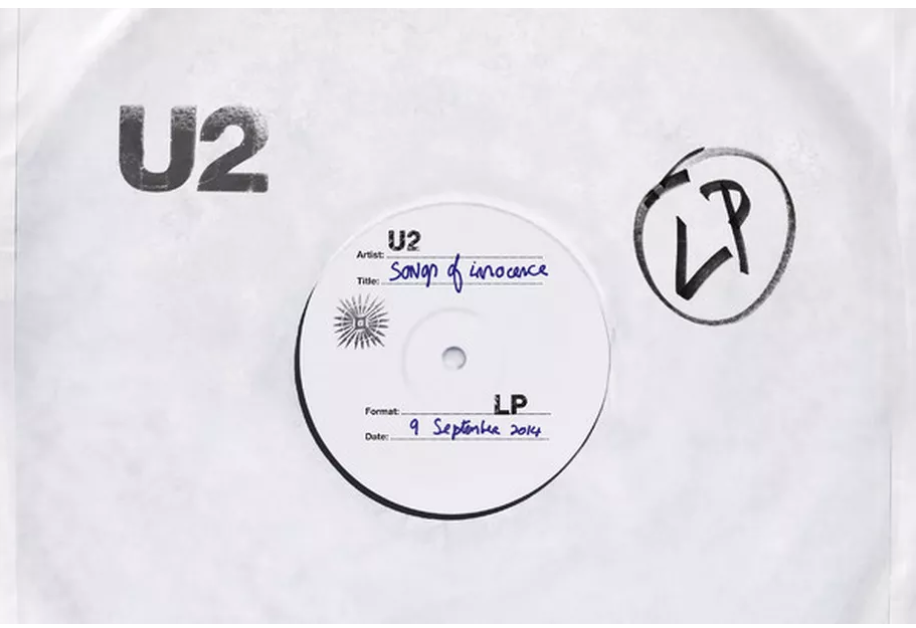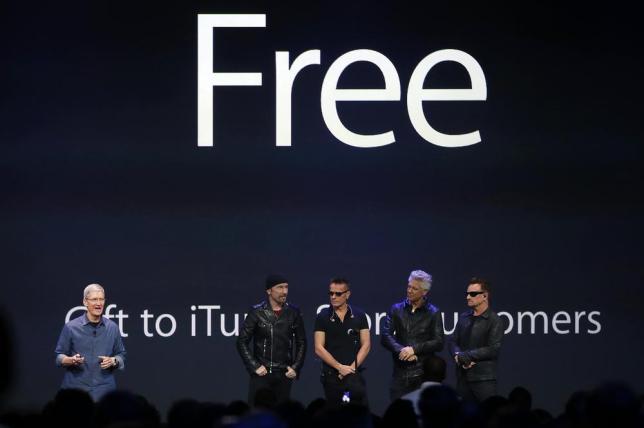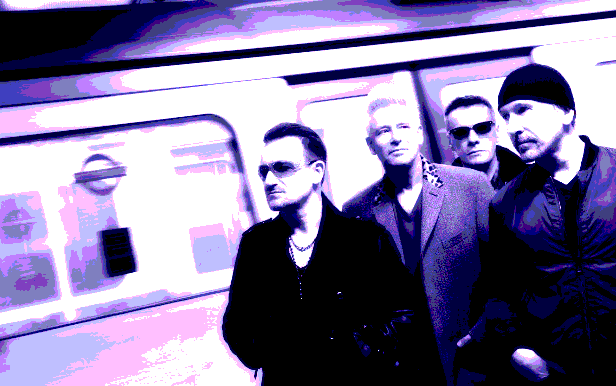
Songs of Innocence is quite possibly U2’s most hated album — but it’s not because of the music. The 2014 release came after five years of relative inactivity for the band. Public anger grew when the group tethered the record’s release to the launch of the sixth iteration of the iPhone and the Apple Watch. The record was meant as a gift for Apple users, but it was met with derision by the press and that complaint line known as social media. Indeed the so-called “violation” of the sacred space of one’s iTunes account became the story of an album U2 hoped would herald their return to relevancy. Alas, the group felt the need to address the hubbub over the free album by issuing an apology to one user in a Facebook video. The old adage that there’s no such thing as bad publicity is didn’t quite apply to Songs of Innocence during the product launch. Maybe it says something about fan loyalty, but even with the controversial free download, the physical release of the CD did some solid sales in certain countries, and its activity on the charts was pretty good, too (for what it’s worth). Now that five years have passed and record’s release is no longer the butt of jokes, it seems the time is right to assess the quality of the songs.

“The Miracle (of Joey Ramone)” is the lead track and one where the group almost falls on their face for lapsing into familiar stereotypes. The song is built on elements that U2 is known for: a big sound. However, this “big sound” gets close to signifying nothing if Bono’s lyrics didn’t save the song from being overblown and bathetic. It’s his intensely personal meditation on the power of music to awaken a sense of self and give direction to the directionless that makes “The Miracle” a keeper — but only barely. “Every Breaking Wave” was rescued by One Republic’s Ryan Tedder. He was the one who moved certain elements around in a rough mix to spotlight a soaring chorus that was originally buried. Tedder knows a thing or two about soaring choruses (probably from listening to U2 records), and his ability to get the song on track created a more cohesive sound.
“California (There Is No End To Love)” starts with The Edge singing “Ba, Ba, Barbara/Santa Barbara” in a way that less Beach Boys and more Brian Eno with an ethereal tone. The tune then gives way to a more conventional structure with less experimentation and more four on the floor. If the lyrics save “The Miracle” from being a dud, it’s the music that saves “California” from being a stiff (as in Dead On Arrival). Lyrically, it seems Bono’s first trip to The Golden State didn’t have much of a profound impression on him — if the lyrics are a reflection of that trip.
Everyone’s a star in our town
It’s just your light gets dimmer
If you have to stay
In your bedroom, in a mirror
Watching yourself…
I wonder if Bono has ever seen “The Californians” on SNL, because these lyrics come pretty close to what that skit is about — well, except for the freeway directions and Fred Armisen’s “WhaaayaadoINGhere” exclamations.
“Song For Someone” is almost up there with the U2 classics. Again, I think Ryan Tedder’s influence pushed the song in a direction where all the elements locked into place to create a wonderful piece. Maybe the guys from Spinal Tap were right when they said: “It’s such a fine line between stupid and clever.” However, in U2’s case, they sometimes find themselves on a fine line between conventional and a tour de force. In “Song For Someone” they were in the latter category. One standout (among many) is a point in the bridge where Bono changes up his phrasing when singing And I’m a long way/From where I was, where I need to be. It’s the kind of flourish where he could have repeated the phrasing from the previous lyric, but chose to increase the emotional appeal by singing in a less boisterous and more quietly passionate manner. That’s part of what makes for a great song — whether by design or because of a happy accident.
“Iris (Hold Me Close) is about Bono’s mother — who died when he was 14. Bono has used his mother as the inspiration for a number of U2 songs, but this one is more focused on the longing to see her again while knowing that as he goes through life he’s “got your life inside of me.” It’s a heartfelt ode to a mother who left this veil of tears too early — and one that employs The Edge’s signature sound in an effective way.
“Volcano” was almost left off the record. It’s wasn’t quite finished as the album delivery date approached, and there was a general agreement that it wasn’t up to the group’s standards. True enough, it’s not anything special at first. However, there is a rather cool and effective thumping bass line The Edge composed for Adam Clayton. And speaking of The Edge, he adds a nice riff at the 1:06 mark lifts the tune out of mediocrity. However, before the song rides out in a plodding way, it gets a second life around 2:23 with a powerful change in musical direction that the band liked so much, they used it on “American Soul” a few years later.
“Raised by Wolves” has power, drama, and tension from the get-go. It is indeed a tense song about a series of terrorist bombings in Ireland that killed 33 people in 1974 — which is the same year Bono’s mother died. The imagery in the lyrics are some of the most direct Bono has written about a political/social crisis in his career:
Boy sees his father
Crushed under the weight
Of a cross in a passion
Where the passion is hate
Blue mink Ford
I’m gonna detonate in your den
Blood in the house
Blood on the street
The worst things in the world
Are justified by belief
The more I listened to this song as I was putting this piece together, the more I became convinced that “Raised by Wolves” is one of U2’s best deep cut tracks of their post-2000 output. It’s easy to criticize the band for this particular record with the way it was launched, how long it took to record, how many producers were brought into the sessions, and how they fussed and fussed over the quality of the songs — probably to the point where they lost perspective on what they were creating. However, the stars aligned for this tune in a way that reminds listeners how U2’s politics were shaped.
One can argue that without The Edge’s guitar work, U2 would be nothing. While listening to the kind of guitar sounds and riffs he brings to this record, it’s clear that he saves the album in many ways. “Cedarwood Road” is a fine example of that. While Bono’s vocal phrasing is good, The Edge knows what kind of spice and hooks to bring in to make it stand out in a way that demands one’s attention. However, that’s not quite the case on “Sleep Like A Baby Tonight.” The song tends to favor texture and sound experimentation to the point where it gets buried in a kind of sonic morass. While, “This Is Where You Can Reach Me Now” does favor a more traditional guitar, drum, and bass orchestration, there’s not a lot that remarkable about the composition. The final track gets the band back on track with the ethereal “The Troubles.” From the title, one would think it’s a song about Northern Ireland’s separatist movement that “Raised By Wolves” addresses. However, that’s not the case. Bono described “The Troubles” as a song about domestic violence that’s supposed to be uncomfortable — but it doesn’t quite achieve what it set out to do. Singer Lykke Li lends co-vocal duties, but she does so on a hook that tends to minimize whatever horror Bono is trying to convey.
Overall, Songs of Innocence is a good U2 record, but not a great one. Granted, at this stage of their career, the band was worried their music wasn’t really relevant anymore. It’s obviously emotionally wrenching to see the culture changing in a way that excludes you — especially if you’re in a group as big as U2. The band could still sell out venues while on tour, but the people who show up for concerts when a band has reached classic status, want to hear the classics. New music from older artists is often greeted with a certain amount of suspicion and skepticism. Anything new is automatically compared with the older and better material — and I’m certainly guilty of this. But what is it that we’re looking for? When it comes to U2, do we really want The Joshua Tree: Volume 10? Or is it more satisfying to see an artist grow, progress, and develop in ways that are exciting, daring, and pleasantly surprising? It’s a tough call because long-time fans can be a conservative bunch. Some artists can be a conservative bunch, too. They find a formula for success and ride that wave for as long as they can. However, the itch to try something new is just too tempting when an artist wants to grow. U2 did that early on. After War, they started to evolve by introducing more layers to their music. By the ‘90s, there was a conscious attempt to weave in a more postmodern sound to their songs (if that term can be affixed to records like Achtung Baby, Zooropa, and Pop). Between 2000 and 2009, U2 seemed to “go back” to their more classic sound — at least at first blush with those records. Underneath the chicken-scratch guitars, soaring choruses, and all the other elements that contribute to U2’s “big sound,” there was a lot of musical experimentation just below the surface. That phase kind of burned itself out by the time No Line On The Horizon was released, so there was a lot riding on Songs of Innocence for the band who felt like they didn’t have anything left to say that was relevant to current culture. A look back seemed to offer them a way to say something about the state of the world — even if it was the world 40 years ago. The innocence they explore on this record is there, but only between the margins of the larger narrative. Life in the past (like life in the present) is fraught with all sorts of emotional slings and arrows — and maybe that’s what U2 was trying to convey on this record. Yes, it was a difficult album to create, their promotional rollout will be remembered as a PR lead balloon, but the music they created — while uneven at times — demonstrated that U2 still had something to say.

I liked many songs on this album. I don’t give an F what critics think.
Ha! That’s the spirit. On a side note, I was talking about this record at work, and the kind of knee-jerk reaction went something like this: “Isn’t that the album Apple forced on everyone?” So even after all these years, people seem to remember the launch and not the music so much.